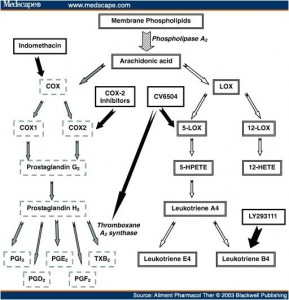NSAIDs Aren’t Good For You!
What follows is more validation of the benefits of Prolotherapy and how you can often alleviate your pain, even in Tulsa, Oklahoma.
I have been in the Army a long time and we’ve seen lots of aches and pains. Medics are routinely instructed to give out Motrin (ibuprofen) for these pains. We give it out so frequently it is generally referred to as “Ranger Candy.”
I was an Athletic Trainer in college. We worked with a lot of athletes and athletic injuries. Standard medical dogma for sports injuries is RICE – Rest, Ice, Compression, and Elevation. The primary purpose for this is to reduce the inflammation and pain. We used a lot of ibuprofen like medications on those athletes as well.
For most of my adult life I thought that the best thing you could do for an injury was to treat it with these NSAIDs (non-steroidal anti-inflammatory drugs).
How They Work
NSAIDs (such as ibuprofen, naproxyn, diclofenac, meloxicam, celecoxib, etc) work by blocking an enzyme in the Arachidonic Acid pathway. Huh? What is that??

One of the enzymes is the cyclooxygenase (COX) enzyme of which there are 2 varieties: COX-1 and COX-2. Most of the NSAIDs on the market today are COX non-selective meaning that they inhibit both of these enzymes. The COX-1 enzyme produces some prostaglandins that are protective. Inhibiting this enzyme can interfere with platelet function and stomach lining protection.
In short, these medications decrease inflammation.
Why We Need Inflammation
Any idea how we actually heal after an injury?
Inflammation is the mechanism by which our body heals. When we decrease inflammation we are decreasing our healing mechanism. In fact, there are studies documenting a decrease in healing after an injury when taking these medications.
In a study published in the American Journal of Sports Medicine, 215 rats had a transection of the patellar tendon at the inferior pole and stabilized with a cerclage suture. They were then randomized to 7 groups. Each group received a different NSAID (ibuprofen, acetaminophen [not an NSAID], naproxen, piroxicam, celecoxib, valdecoxib, or control) for 14 days. At 14 days the rats were sacrificed and the tendons were loaded to failure.
The naproxyn, piroxicam, celecoxib, and valdecoxib groups all had failures of the cerclage suture. This means that they didn’t heal well. Ibuprofen and acetaminophen didn’t seem to have this effect. These results were statistically significant with a P < 0.001. Other studies have demonstrated impaired healing in tendons while taking ibuprofen.
Another study published in the Journal of Applied Physiology showed that runners did not develop the same collagen adaptation to running if they took anti-inflammatory medications.
So, taking NSAIDs (any of them!) is a Faustian bargain. You trade the long term decreased healing for short term pain management. You are making a deal with the devil and he will come back later to collect!
If you want to heal then you should avoid all of these anti-inflammatory medications after an injury. In fact, the only time I typically prescribe them is for non musculoskeletal pain. It simply isn’t worth it!
When you have these injuries you want your body to heal! Most things will heal themselves, on their own within about 6 weeks. However, for those injuries and pains that don’t resolve, look at prolotherapy! It helps your body heal.
It is fairly obvious that taking these medications slows or prevents the healing process. That is certainly one of the reasons that they medicines should be avoided for musculoskeletal pain. But there are other reasons as well.
Side Effects
NSAIDs inhibit the formation of prostaglandins which increase inflammation but some of them are protective as well. Some of these chemicals are protective to the lining of the stomach. Taking NSAIDs erodes this lining and makes the stomach more likely to have ulcers. They can increase the risk of gastrointestinal bleeding. For some people this can be life threatening.
The prostaglandins have a role is regulating blood flow to the kidneys. NSAIDs can affect his blood flow. This can affect blood pressure. Thus, these medications can worsen hypertension.
The thromboxanes affect the platelets. NSAIDs affect the thromboxanes altering the way platelets clump together. The platelet effect is proposed to be one of the reasons that these medications can increase the risk of cardiovascular disease. In fact, if you are having a heart attack, one of the first things we do is to stop your NSAIDs.
These effects can be profound and severe is some cases. Use of these medications is not completely benign and there are potentially severe consequences. As with everything in medicine, the risks and benefits need to be carefully weighed. In many cases, the risks of NSAIDs outweigh the benefits.
Something to consider.
References:
- http://ajs.sagepub.com/content/35/8/1326
- http://jap.physiology.org/content/110/1/137
- http://www.ncbi.nlm.nih.gov/pmc/articles/PMC2770552/
- http://www.caringmedical.com/sports-injuries/nsaids-why-we-do-not-recommend-them/
- http://www.ncbi.nlm.nih.gov/pubmed/16463375
- http://runnersconnect.net/running-injury-prevention/are-anti-inflammatories-the-right-choice-for-treating-injuries/






